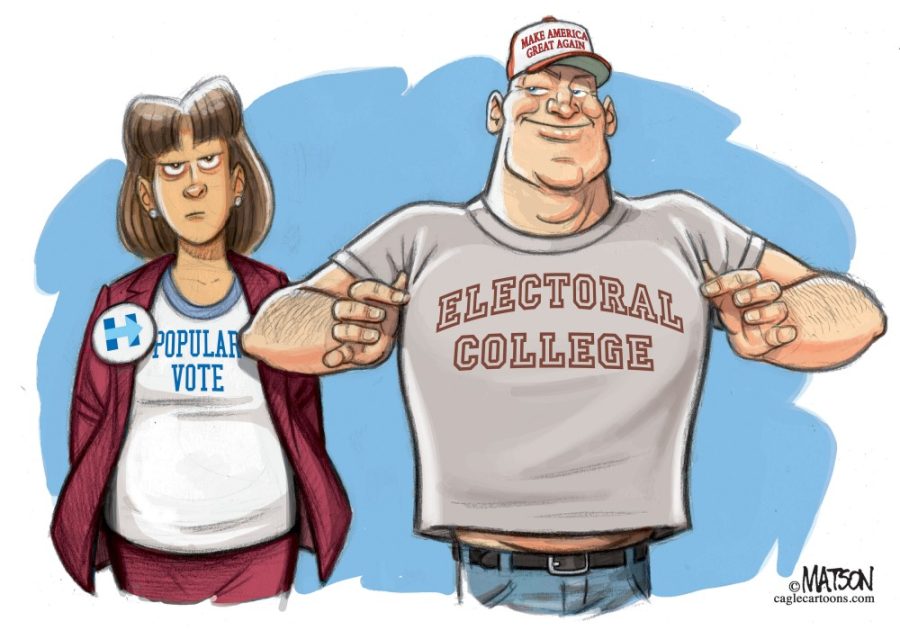The Electoral College is rejected by many U.S. citizens because it either seems pointless or unfair, but it plays an important role in making elections more fair for a broader area of the country.
At first glance, it is easy to see how the Electoral College is a roundabout way to pick a president when they could be chosen based on the popular vote. It only seems fair, right? The candidate who won the majority gets to be the next president.
But, just like most governmental systems, there is a lot more to it than meets the eye.
This year’s presidential election was the fifth time in history that the president elect did not win the popular vote.
RELATED: Defend democracy with the Democrats
This may make the Electoral College system seem obsolete, because it normally it’s perceived to have very little effect on the outcome of the election, and when it does have an effect it doesn’t seem like the reasonable solution.
However, while the outcome may not be perfectly fair, the system itself gives a greater voice to the American people who would not have a voice in a fully democratic system.
One reason why some people disagree with the Electoral College is it’s distribution of electoral votes.
For example, California has the highest population in the U.S., with 38.8 million people, and 55 gets electoral votes. That means that for around every 705,454 voters in California there is one electoral vote.
Wyoming, on the other hand, is the least populated state in the U.S. There are only 584,153 people who live in Wyoming. This means that because Wyoming has 3 electoral votes, the ratio between electorates and people is: 1 vote for every 194,717 voters.
Still seems unjustified doesn’t it? Why does the Wyoming voter get more of a say than the California voters?
The system is skewed for a reason, because without the Electoral College, the voters in Wyoming would be very unimportant in deciding election outcomes. Candidates might never even have to visit the state, or any other small state for that matter.
Even though in the current system the people of Wyoming have around 3.6 times the voice of the voters in California—based on the population example—because of its large size California cannot be overlooked in the election.
There are 29 states in the U.S. with less than 10 electoral votes a piece. Without those electoral votes, which are worth more in this system than in the popular vote system, the candidates would have no reason to campaign in any of those 29 states, because they could win solely based on the big states.
In a popular vote system, not only would big states be targeted, but big cities would especially be targeted.
Even though cities have a large impact on the state’s vote already, the state’s concerns are ideally being addressed as a whole. A candidate in the popular system could cater their campaign to the largest city in a given state and still have a successful campaign.
RELATED: Learning from Trump’s victory
If cities are the only ones that the candidates campaign for, then rural voters are completely disenfranchised.
These voters still have the right to vote of course, but there is no incentive for a candidate to represent them, which would potentially hurt the livelihood of rural voters all together because the election would have hardly any bearing on them.
The Electoral College also prevents regional candidates. In our current system, the candidates have to branch out to the other states in order to get votes, especially in the swing states.
In the popular system, if a candidate is liked enough by one area of the country, then it is likely possible for them to win based on that one region. Even though that candidate may be beneficial for a specific area of the country, it doesn’t mean they are good for the rest.
This isn’t an argument that the Electoral College is a flawless system, but it does play a more important role than most might think. There are plenty of other ways that the U.S. could vote besides the Electoral College, but the popular vote shouldn’t be one of them.
Follow Claudia Drace on Twitter.









